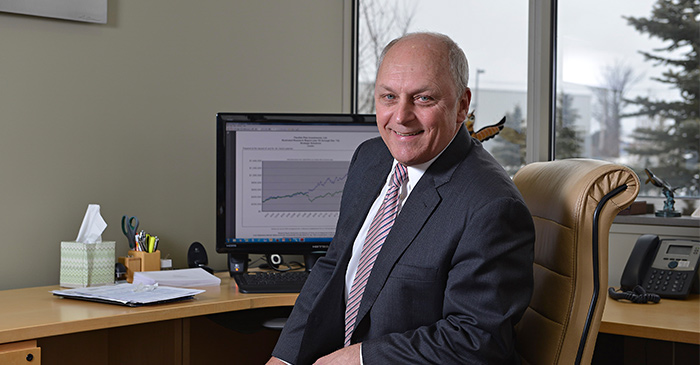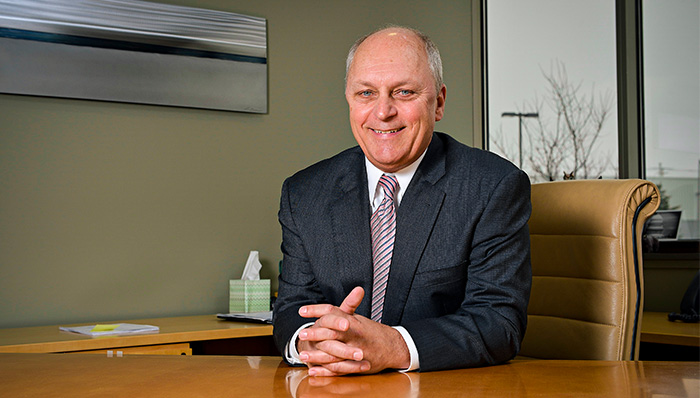A scientific mindset
A scientific mindset

David Lademan • Lansing, MI
Capital Strategies, LLC • Kalos Capital, Inc.
David Lademan is a self-professed “seeker of truth.”
This might not be surprising, as Lademan spent his early business career as a chemical engineer for Monsanto and later was an expert insurance risk manager, including earning a coveted Tribunalized Correspondent status for Lloyd’s of London.
He then segued to what he calls his real passion in financial services, specializing in “helping people develop stable, reliable, inflation-adjusted retirement income.”
Lademan has been principal of Capital Strategies, LLC, in Lansing, Michigan, since 1999, with the firm concentrating in comprehensive financial planning, income planning, and investments for high-net-worth individuals. Lademan offers securities through broker-dealer Kalos Capital, Inc., based in Alpharetta, Georgia.
Lademan brings a rigorous scientific and mathematical mindset to his practice, especially in the investment arena. He says, “If you’re a scientist, what you do is look for the truth. It really doesn’t matter what you thought the result should have been or could have been. Once you find out what the truth is then you know your parameters and constraints. And you have to work within those factors to develop the optimized outcomes as an advisor for your clients.”

This rigorous approach has created two broad belief systems for Lademan.
The first involves the needs of his clients, who are chiefly concerned with growing and protecting their retirement futures. According to Lademan, they require a strategically diversified plan utilizing separate but interconnected strategies for growth, income production, and long-term money they “should not outlive.”
To meet these objectives, Lademan turns to a blended approach of three elements: (1) annuities and life insurance; (2) non-traded public offerings, alternative investments, and private equity; and (3) active investment management with algorithmically traded funds.
Lademan has a strong rationale for each element of his three-pronged approach:
1. “The money you cannot outlive is best provided by an insurance product. Some people prefer and/or need the guarantees provided by annuities or life insurance. Use time and compounding as your ally and you really do not have to worry too much about it—they offer very low risk and guaranteed growth.
2. “For income and diversification, I like to use what I call the ‘endowment model of alternatives, private equity and non-traded public offerings.’ Every investment has some element of risk, but with the proper analysis of underwriting and a high level of due diligence, these types of investments can pay healthy inflation-adjusted dividends, offer tax advantages, and can lower overall portfolio volatility.
3. “And, lastly, all investors seek and need to maximize returns over a long period of time under varying and sometimes hostile economic environments. To do this, we turn to active investment management, with strategies that utilize many asset classes, sectors, and indices that can be leveraged both long and short. We use an algorithmic approach that is intended to perform under all market conditions and help manage what can often be a risky and hostile market environment.”
This last point leads to his second broad belief system, which focuses on active management. Lademan contends that the age-old reliance on traditional sector allocations, rebalancing, and “buy and hold” is just not adequate for the markets or client needs of the 21st century. He adds, “It is my belief that purely quantitative active money management has the best chance of delivering the intended result: maximizing the growth of the portfolio to increase the chance of meeting all future contingencies. In order to do this through any economic environment, you must be able to go long and short and use leverage when appropriate.
“There are two reasons. The first is based on a confidence in quantitative analysis. The sheer number of indices that can be evaluated and the interrelationships between those indices as part of a singular decision to reallocate a position from a one-to-one to a leveraged position or to a short position is best accomplished by an algorithm to diminish the subjectivity that as humans we all impart to our decisions.
“The second reason is that using algorithms will help you to maintain a better relationship with your client. When you have a computer making the decisions to buy and sell positions, which are strictly responsive to a disciplined strategy, there is no second-guessing. You and your client learn to accept and rely on the computer’s decision-making process. Buying and selling of positions is what active management is all about, but you also get a secondary beneficial assist in helping you keep your relationship strong.”

Within this active management construct, Lademan utilizes a wide range of strategies, from systematic trend-following equity strategies to managed sector index funds to long/short bond portfolios. But even with his devotion to algorithmic investing and trading strategies, he recognizes that vigilance in “managing the models” cannot be overlooked. He explains one such situation:
“While speed of re-allocation is a factor in active management, the more important choice for financial advisors is not about the speed of change but which algorithms are most effective for the macro-economic environment we are in, and whether the algorithms that you are employing for your client’s portfolio are working according to expectations.
“You just can’t pick an algorithm, set it, and forget it. Recently, I replaced an algorithm I had chosen for my clients’ portfolios that was not working well, certainly not as I would have expected given market conditions.
“If there are unique external forces creating conditions that are heretofore unprecedented, you have to move the allocation. Events affect the market, as do governmental policies, changes in the tax law, and political and social changes.
“In this specific case, the impact of quantitative easing and subsequent Federal Reserve actions did not have the effect on bond markets one would expect. It confounded everyone. You must be willing to adapt and make changes. And that is also why a stable of different types of algorithms is necessary for any third-party manager I choose to do business with.”
Lademan concludes, “Clients know what they want from a good financial advisor. I joke with them that they want the perfect investment: 20% return on investment per year, no market risk, 100% liquidity, and earnings that are tax-free. While they recognize we may not deliver all of that, the closer you can come in satisfying those criteria, the better you will be regarded. So our focus is maximization of after-tax earnings while minimizing the risk of capital loss. That works for us and our clients.”
Disclosure: Securities offered through Kalos Capital, Inc. and investment advisory services offered through Kalos Management, Inc., both at 11525 Park Woods Circle, Alpharetta, Georgia 30005, (678) 356-1100. Capital Strategies, LLC, is not an affiliate or subsidiary of Kalos Capital, Inc., or Kalos Management, Inc.
Photography by Tony Segielski Photography

